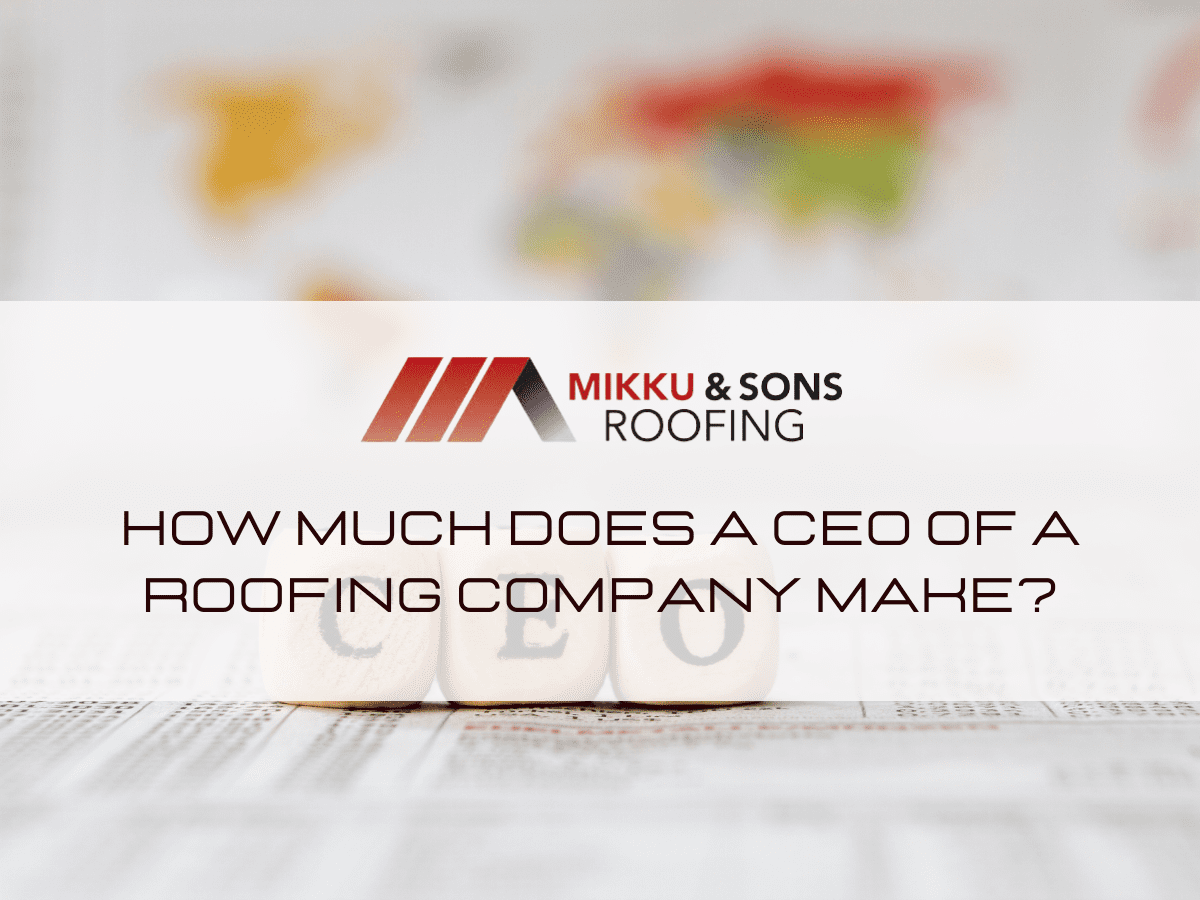

The role of a CEO in a roofing company is to provide strategic direction and leadership, oversee daily operations, and make important decisions that impact the company's success. As the top executive, a CEO is typically responsible for setting goals, developing plans and policies, and evaluating performance.
With such significant responsibilities, it is not surprising that CEO salaries can vary widely, depending on a range of factors. But how much does a CEO of a roofing company make?
According to data from various sources, the average salary for a CEO in the roofing industry is around $80,000 to $98,000 per year. This is, of course, only a ballpark figure; certain CEOs may make much more or much less than the average based on their individual skills and experience, as well as the requirements and goals of their company.
Mikku and Sons Roofing aims to educate on all the parameters of the roofing industry, including how much a roofing company CEO earns. We will therefore explore how much they can expect to make, taking into account the various factors that determine this.

The exact salaries of roofing company CEOs in various states can vary widely depending on a variety of factors. However, according to data from salary websites Glassdoor and Payscale, the average salaries for CEOs in the roofing industry in the top 5 states (based on population) are as follows:
It is worth noting that these figures are just estimates and do not reflect the full range of salaries that a CEO in the roofing industry may earn in these states. Some CEOs may earn significantly more or less than the averages reported by these websites, depending on the specific circumstances of the company and the CEO.
In recent years, the topic of CEO salaries has garnered significant attention and scrutiny. While some argue that these high salaries are justified due to the complex and demanding nature of the role, others believe that they are excessive and not reflective of a CEO's actual contributions to the company.
We will explore the various factors that can impact a CEO's salary and through this analysis, we hope to shed light on the complex and often opaque process of CEO compensation.
Size and profitability of the company
The size and profitability of a roofing company can have a major impact on the salary of its CEO. Larger companies with higher revenues and profits may be able to afford to pay their CEO a higher salary than smaller companies.
For example, a roofing company with $10 million in annual revenues may be able to pay its CEO a higher salary than a company with $5 million in annual revenues. This is because the CEO's responsibilities and level of authority tend to increase with the size of the company, and the CEO's role in driving growth and profitability becomes more important.
Industry and market conditions
The roofing industry is a competitive and fast-changing sector, and the demand for roofing services can fluctuate based on a range of factors, including the economy, weather conditions, and the regulatory environment. As a result, the salary of a CEO in the roofing industry can be affected by the overall health and performance of the industry.
For example, a CEO of a roofing company that is experiencing strong growth and demand for its services may be able to negotiate a higher salary compared to a CEO of a company that is struggling to keep up with the competition.
Location and cost of living
The location of a roofing company can also impact a CEO's salary, as the cost of living and average salaries vary widely across different regions. For example, a CEO of a roofing company in a large metropolitan area with a high cost of living, such as New York City or San Francisco, may earn a higher salary than a CEO of a company in a smaller city or rural area with a lower cost of living.
This is because the CEO's salary needs to be sufficient to cover their living expenses and maintain their standard of living in the location where they are based. According to the Council for Community and Economic Research, the cost of living index for New York City is 195.4 (with the national average being 100), while the cost of living index for San Francisco is 273.9. In comparison, the cost of living index for a smaller city like Omaha, Nebraska is 92.9.
CEO's education, experience, and performance
The education, experience, and performance of a CEO can also play a role in determining their salary. A CEO with a higher level of education, such as a master's degree or MBA, may be able to command a higher salary than a CEO with only a bachelor's degree.
Similarly, a CEO with extensive experience in the roofing industry or in a leadership role may be able to negotiate a higher salary than a CEO with less experience. Finally, a CEO's performance can impact their salary, as companies may be willing to pay a higher salary to a CEO who has a track record of delivering results and driving growth.
How much can a CEO of a roofing company expect to make? According to data from the U.S. Bureau of Labor Statistics, the median annual wage for a CEO in the roofing industry was $115,440 in 2020. However, it is important to note that this figure represents the median wage, meaning that half of all CEOs in the roofing industry earned more than this amount, while the other half earned less.
To get a better idea of the average salary of a CEO in the roofing industry, we can look at salary surveys and other sources of data.
According to Payscale, the median annual salary for a CEO in the roofing industry is $80,000. However, this figure should be taken with a grain of salt, as it is based on self-reported salary data and may not be representative of the entire industry.
PayScale estimates that a CEO of a small roofing firm (one with fewer than 50 employees) may expect to earn an annual income of $101,846. For CEOs of medium-sized roofing companies (50-99 people), this amount rises to $119,398 annually, and for CEOs of large roofing companies, it rises to $147,866 annually (100 or more employees).
Glassdoor is a job and salary marketplace where users can post anonymous salary histories and receive salary statistics from other users. Glassdoor reports that the typical compensation for a CEO in the roofing sector is $98,000 annually.
However, it's important to note that this estimate relies on a relatively small sample size and so might not be representative of the whole.
According to data from Salary.com, the average salary for a CEO with a bachelor's degree in the roofing industry is $119,998 per year, while the average salary for a CEO with a master's degree is $131,482 per year. Salary.com reports that the median annual salary for a CEO in the roofing industry is $85,447, based on self-reported salary data.
The education and experience of the CEO can also impact their salary in the roofing industry. Those with advanced degrees or extensive experience in the field may be able to negotiate higher salaries due to their expertise.
Overall, the average salary of a CEO in the roofing industry can vary widely depending on the size of the company, the location, and the CEO's education and experience. Understanding these factors can help both employees and stakeholders get a sense of the expected salary for a CEO in this industry.
It is worth noting that these figures are just estimates and do not reflect the full range of salaries that a CEO in the roofing industry may earn. Some CEOs may earn significantly more or less than the average, depending on the factors discussed earlier, such as the size and profitability of the company, industry and market conditions, location and cost of living, and the CEO's education, experience, and performance.

As the head of a company, a CEO has the potential to earn a significant salary and enjoy a high level of earning potential. However, there are a number of factors that can impact a CEO's earning potential.
By understanding these complex and multifaceted factors, we can gain insight into the CEO compensation process and these top executives' earning potential. While many factors can impact a CEO's salary, there are also several things that a CEO can do to increase their earning potential.
Here are a few:
A CEO's ability to negotiate their salary and benefits package can have a significant impact on their earning potential. This may involve leveraging their education, experience, and performance to negotiate a higher salary, or negotiating for additional benefits such as stock options or bonuses.
Some key factors that can affect a CEO's negotiating skills include their ability to communicate effectively, their knowledge of the industry and market conditions, and their ability to persuade and negotiate effectively.
The willingness of a company to pay a competitive salary to its CEO can also affect the CEO's earning potential. Companies that are willing to pay top dollar for top talent may be more likely to attract and retain top executives, while companies that are unwilling to pay competitive salaries may struggle to attract and retain the best talent.
This can be influenced by a range of factors, including the company's financial situation, its priorities and goals, and its overall culture and values.
A CEO's ability to drive revenue and profits can significantly impact their earning potential. A CEO who is able to drive growth and increase profits for the company is likely to be more valuable to the company and may be able to negotiate a higher salary as a result.
This can involve implementing strategic initiatives and plans that drive growth, maximizing efficiency and profitability, and making smart business decisions that benefit the company. Some key skills that can help a CEO drive revenue and profits include financial acumen, strategic thinking, and leadership skills.
